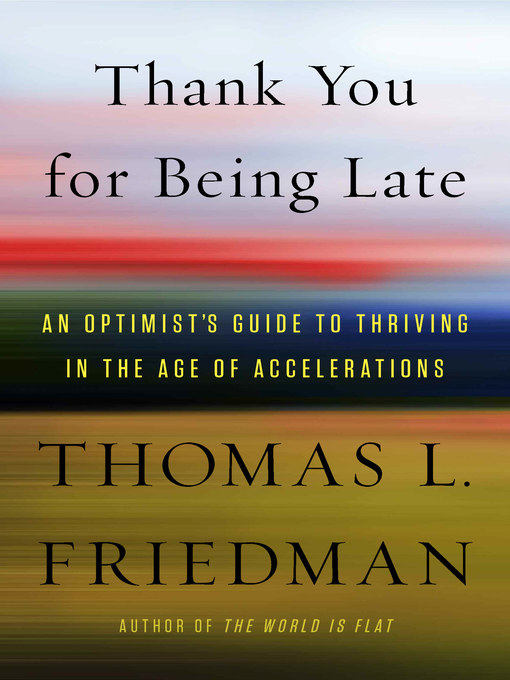
Thank You for Being Late
An Optimist's Guide to Thriving in the Age of Accelerations
کتاب های مرتبط
- اطلاعات
- نقد و بررسی
- دیدگاه کاربران
نقد و بررسی

October 10, 2016
Friedman (coauthor of That Used to Be Us), a three-time Pulitzer Prize winner for his work as a reporter with the New York Times, engages in an intelligent but overlong discussion of the faster paces of change in technology, globalization, and climate around the world. His core argument is that “simultaneous accelerations in the Market, Mother Nature and Moore’s law” (the principle that the power of microchips doubles every two years) constitute an “Age of Accelerations,” in which people who feel “fearful or unmoored” must “pause and reflect” rather than panic. Friedman opens with slow-paced, wordy, and at times highly technical discussions of each of his accelerations, with examples that include solar-powered waste compactors, pedometer-wearing cows, the Watson computer’s wrong answer on Jeopardy!, and geopolitics. He then offers personal and policy recommendations for coping with accelerations, such as self-motivation, a single-payer health care system, lifelong learning, and encouraging more people to follow the Golden Rule. Unfortunately, Friedman’s intriguing facts and ideas are all but buried under too many autobiographical anecdotes and lengthy recollections about the circumstances of interviews he conducted and research he completed, giving readers the recipe and history of all the ingredients along with the meal. Agent: Esther Newberg, ICM.

Starred review from October 1, 2016
The celebrated New York Times columnist diagnoses this unprecedented historical moment and suggests strategies for resilience and propulsion that will help us adapt.Are things just getting too damned fast? Friedman (Hot, Flat, and Crowded: Why We Need a Green Revolutionand How It Can Renew America, 2008, etc.) cites 2007 as the year we reached a technological inflection point. Combined with increasingly fast-paced globalization (financial goods and services, information, ideas, innovation) and the subsequent speedy shocks to our planets natural system (climate change, biodiversity loss, deforestation, geochemical flows), weve entered an age of accelerations that promises to transform almost every aspect of modern life. The three-time Pulitzer winner puts his familiar methodologyextensive travel, thorough reporting, interviews with the high-placed movers and shakers, conversations with the lowly moved and shakento especially good use here, beginning with a wonderfully Friedman-esque encounter with a parking attendant during which he explains the philosophy and technique underlying his columns and books. The author closes with a return to his Minnesota hometown to reconnect with and explore some effective habits of democratic citizenship. In between, he discusses topics as varied as how garbage cans got smart, how the exponential growth in computational power has resulted in a supernova of creative energy, how the computer Watson won Jeopardy, and how, without owning a single property, Airbnb rents out more rooms than all the major hotel chains combined. To meet these and other dizzying accelerations, Friedman advises developing a dynamic stability, and he prescribes nothing less than a redesign of our workplaces, politics, geopolitics, ethics, and communities. Drawing lessons from Mother Nature about adaptability, sustainability, and interdependence, he never underestimates the challenges ahead. However, hes optimistic about our chances as he seeks out these strategies in action, ranging from how AT&T trains its workers to how Tunisia survived the Arab Spring to how chickens can alleviate African poverty. Required reading for a generation thats going to be asked to dance in a hurricane.
COPYRIGHT(2016) Kirkus Reviews, ALL RIGHTS RESERVED.

June 15, 2016
Self-driving cars. WiFi-enhanced air flight. A landscape remade by climate change. Dizzying diversity in personal income. "New York Times" columnist Friedman, a three-time Pulitzer Prize winner and the author of best sellers like "The World Is Flat", uses his Minne-sota childhood as a baseline to consider how we can better cope with a world that's accelerating in exciting and dangerous ways. His recommendations? Both nations and individuals must be innovative and adaptable while blocking the urge to just go with the flow (bedrock values matter), and we must all skip social Darwinism and find ways to support those who are victims of rapid change.
Copyright 2016 Library Journal, LLC Used with permission.

























دیدگاه کاربران